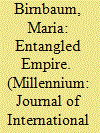| Srl | Item |
| 1 |
ID:
184141


|
|
|
|
|
| Summary/Abstract |
In this article I trace the transnational history of Pakistan and Israel, focusing on the global politics of religion entailed therein. I study the often-overlooked intra-imperial dynamics and the ways in which these intersected with the colonial and post-colonial sociology of knowledge, the politics of cultural diversity and the changing international order. I illustrate how the census and the enumeration of minorities, the claim to political representation, and the transition from ‘minority’ to ‘nation’ shaped that which could be recognised as religious difference as well as the states defined by it. I thereby show how the colonial governmental logic that structured the minority politics of the British Indian Muslims and the Palestinian Jews both limited and enabled the claims to the nations and the states that came to replace them. The case study focuses on two key individuals in the history of the Indian and Palestine partition, and the Pakistani and Israeli independence that followed, Reginald Coupland and Muhammad Zafarullah Khan. I ask how they, the institutions they represented, and the ideas they carried, circulated and influenced changed over the final decade before independence. In the final part of the article, I argue that claims for the recognition of religion in international relations (IR) are not separate from these forms of colonial epistemological politics but are intimately connected to them. By studying the global, entangled politics of religion we can begin to understand the costs of its recognition.
|
|
|
|
|
|
|
|
|
|
|
|
|
|
|
|
| 2 |
ID:
138764


|
|
|
|
|
| Summary/Abstract |
This article attempts to demonstrate the importance of the discursive context for whether and, if so, how the European Union (EU) can exert normative power in different policy areas. Surprisingly, the concept of power has not been extensively discussed in the academic literature on Normative Power Europe, with the notable exceptions of Diez (2013); Keene (2012); Forsberg (2011) and Huelss (2011) (who also discuss the meaning of the ‘normative’). Focusing on power, the question asked in this article is how the discursive context of the politics of religion affects the EU’s ability to exert normative power in this area. The article examines the politics of religion by looking at the case of the debate about human rights versus religion in the United Nations Human Rights Council after the year 2000. The broader point addressed in the article is whether the EU can exert normative power regardless of the discursive context of the policy area concerned.
|
|
|
|
|
|
|
|
|
|
|
|
|
|
|
|